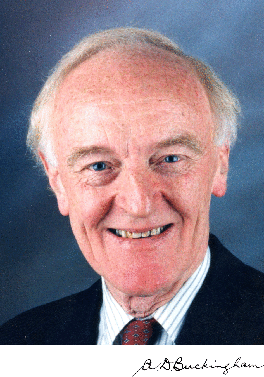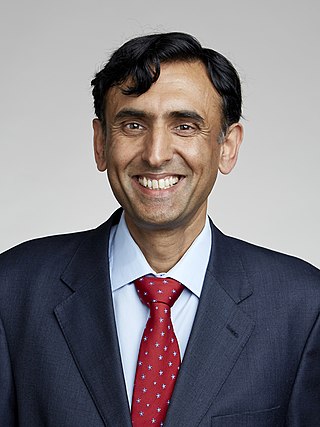Herbert Eric Huppert is a British geophysicist. He has been Professor of Theoretical Geophysics and Foundation Director, Institute of Theoretical Geophysics, at the University of Cambridge, since 1989 and Fellow of King's College, Cambridge, since 1970.

Malcolm Leslie Hodder Green was Professor of Inorganic Chemistry at the University of Oxford. He made many contributions to organometallic chemistry.

Richard Henderson is a British molecular biologist and biophysicist and pioneer in the field of electron microscopy of biological molecules. Henderson shared the Nobel Prize in Chemistry in 2017 with Jacques Dubochet and Joachim Frank. "Thanks to his work, we can look at individual atoms of living nature, thanks to cryo-electron microscopes we can see details without destroying samples, and for this he won the Nobel Prize in Chemistry."

Amyand David Buckingham born in Pymble, Sydney, New South Wales, Australia was a chemist, with primary expertise in chemical physics.
David Michael Patrick Mingos, FRS is a British chemist and academic. He was Principal of St Edmund Hall, Oxford from 1999 to 2009, and Professor of Inorganic Chemistry at the University of Oxford.

Daan Frenkel is a Dutch computational physicist in the Department of Chemistry at the University of Cambridge.
Dame Lynn Faith Gladden is the Shell Professor of Chemical Engineering at the University of Cambridge. She served as Pro-vice-chancellor for research from 2010 to 2016.

Sir Christopher Martin Dobson was a British chemist, who was the John Humphrey Plummer Professor of Chemical and Structural Biology in the Department of Chemistry at the University of Cambridge, and Master of St John's College, Cambridge.
Fraser Andrew Armstrong is a professor of chemistry at the University of Oxford and a Fellow of St John's College, Oxford.
Derek John Fray is a British material scientist, and professor at the University of Cambridge.

Sir Shankar Balasubramanian is an Indian-born British chemist and Herchel Smith Professor of Medicinal Chemistry in the Department of Chemistry at the University of Cambridge, Senior Group Leader at the Cancer Research UK Cambridge Institute and Fellow of Trinity College, Cambridge. He is recognised for his contributions in the field of nucleic acids. He is scientific founder of Solexa and biomodal.

Jenny Nelson is Professor of Physics in the Blackett Laboratory and Head of the Climate change mitigation team at the Grantham Institute - Climate Change and Environment at Imperial College London.

John Paul Attfield is a Professor of Materials science in the School of Chemistry at the University of Edinburgh and Director of the Centre for Science at Extreme Conditions (CSEC).
Sir David Klenerman is a British biophysical chemist and a professor of biophysical chemistry at the Department of Chemistry at the University of Cambridge and a Fellow of Christ's College, Cambridge.

Jas Pal Singh Badyal is a professor in the Department of Chemistry at Durham University. He has been Chief Scientific Adviser for Wales in the Welsh Government since February 2023.

William I. F. David is a professor of Materials Chemistry in the Department of Chemistry at the University of Oxford, an STFC Senior Fellow at the ISIS neutron source at the Rutherford Appleton Laboratory and a Fellow of St Catherine's College, Oxford.

James Robert DurrantFRSC FLSW is a British photochemist. He is a professor of photochemistry at Imperial College London and Sêr Cymru Solar Professor at Swansea University. He serves as director of the centre for plastic electronics (CPE).

Sarah (Sally) Lois Price is Professor of Physical Chemistry at University College London.

Ian William Murison Smith was a chemist who served as a research fellow and lecturer in the Department of Chemistry, University of Cambridge from 1963 to 1985 and Professor of Chemistry at the University of Birmingham from 1985 to 2002.
John Philip Simons is a British physical chemist known for his research in photochemistry and photophysics, molecular reaction dynamics and the spectroscopy of biological molecules. He was professor of physical chemistry at the University of Nottingham (1981–93) and Dr. Lee's Professor of Chemistry at the University of Oxford (1993–99).













